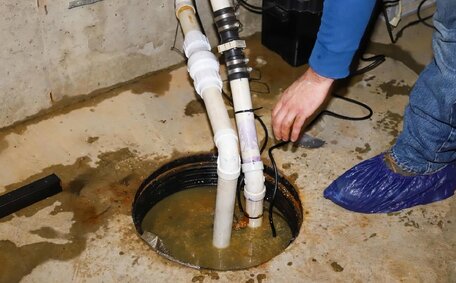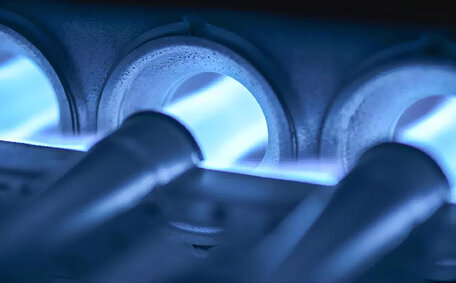Understanding the Capacity of Your Hot Water System
Knowing your water heater’s capacity is crucial to ensuring a sufficient hot water supply for your home.
Household water heaters generally have capacities from 150 to 300 litres. Undersized units can result in hot water shortages, especially during peak times when your household’s water usage is highest.
To avoid running out of hot water, consider these average usage rates:
- Showers (which heat up and draw from the water tank) - 9 litres per minute
- A bath - 80 litres
- Running the hot water tap in the kitchen - 12 litres per minute
Estimate how much water can be utilised by your household during periods of frequent hot water use during peak hot water periods to determine the minimum capacity your hot water tank should deliver. Choosing the right-sized hot water tank is essential to meet your usage demands. Speak to a plumber if your usage demands are exceeding your existing system size.
Upgrading to a more substantial system or a continuous flow model can guarantee a constant hot water supply. Factor in your specific needs to select the appropriate system.
Common Causes For Running Out of Hot Water
Several reasons may lead to your water heater running out of hot water faster than expected or failing to heat water properly:
- Increased household demand - Situations such as 'does my shower take too long to heat up all the necessary water?' or extended use of your shower, and higher occupancy can cause your standard system to drain more quickly.
- Faulty water heater - Components like worn heating elements, broken thermostats, sediment buildup, and leaks can affect performance.
- Undersized system - An inadequately sized hot water system will struggle to meet household peak demands.
- Old natural gas electric water heater - If you’re having issues and your appliance is beyond the typical lifespan, maybe its time to consider a replacement, as performance and efficiency decline with age.
- Interruptions to your gas supply or power - Problems like electrical issues or gas outages can shut down your hot water heating system.
Keep an eye on your hot water use, especially during peak times, to effectively manage your supply and prevent shortages. Upgrade if your system is consistently falling short.
Faulty Heating Elements
Check the heating element, integral to electric and gas systems alike, as it directly heats the water. Look out for these indicators of a malfunctioning heating element:
- Experiencing no hot water at all
- Water that only reaches cold water temperatures
- Reduced amount of hot water available
- Hot water runs out quicker
- Burning smell from your unit
- Tripping electrics
To test the heating element, switch off the unit’s power and water, then examine for cracks, damages, or burnt wiring. A multimeter can also be used to check if it is still conducting properly.
If unsure, contact a professional plumber like Paddington Plumbing to conduct checks and ensure your flow hot water system is functioning properly by replacing faulty heating elements if needed. Improper DIY repairs risk electrocution, burns, water damage and voiding warranties so are best left to the experts.
Sediment Buildup
Over time, reduced hot water availability may occur when sediment, often a symptom of hard water, builds up following a broken dip tube within your storage tank. This sediment layer reduces heating efficiency, resulting in less available hot water.
To prevent sediment accumulation, perform an annual tank flush. Disconnect power and water, open the drain valve to clear sediment, and examine the wastewater to assess debris removal.
Should preventive draining not suffice, an electric hot water system may require professional descaling to remove persistent sediment. The heating elements may also need checking for any damage from excessive exposure to sediment.
Thermostat Issues
The thermostat controls the temperature of the water in your hot water system. A malfunctioning thermostat could cause fluctuating hot water temperatures or inadequate heating.
Why do issues occur with your hot water heater? Common problems include:
- Thermostat set too low - Check your thermostat is set between 50-60C
- Failed thermostat - The thermostat may not be accurately sensing water temperature
- Damaged thermostat - Exposure to excess heat or corrosion can damage the thermostat
To troubleshoot, reset your thermostat by switching it off for 30 seconds and then back on. If the issues persist, you may need a professional thermostat replacement. A faulty thermostat left unchecked can reduce heating efficiency, resulting in your hot water working less effectively during high demand periods.
For thermostat repairs or replacements, contact the licenced professionals at Paddington Plumbing. We can source quality thermostats tailored to your system.
Diagnosing Issues With Gas and Electric Systems
When troubleshooting hot water systems, there are key differences in diagnosing gas versus electric systems, so it’s important to get your hot water system accurately diagnosed. For your gas systems, ensure that the pilot light is lit, and the thermocouple is operational so it doesn’t shut off gas supply unexpectedly. If the pilot goes out frequently, the thermocouple may need replacing.
A thermocouple measures the pilot flame, signalling the gas valve to open and allow gas flow to the burner which heats water when needed.
In electric systems, inspect the heating element comprehensively for signs of wear, such as cracks, sediment buildup, or damaged wiring.
Regardless of system type, if you need help, check valves, pipes and connections for leaks, blockages or corrosion issues impeding water flow or heating capacity. Thermostats in both gas and electric units also need proper calibration to 50-60°C to sufficiently heat water.
For additional assistance diagnosing more complex hot water issues, the licenced professionals at Paddington Plumbing are always happy to help. Contact us to book a service call.
Checking Power and Fuel Supply
It’s crucial to check that your hot water system has consistent power and fuel supply. For electric hot water units, routinely check the circuit breaker to ensure it’s functioning correctly and test outlets for voltage. Gas systems should be thoroughly examined for a gas leak, making sure to test connections with leak detector fluid or soap solution.
When dealing with electrical or gas elements, things can be risky so take safety precautions like turning off switches/valves and avoiding live wires. If you smell gas or detect leaks, shut off supply immediately as these could lead to serious hazards, and contact the gas company right away. Ventilate the area to prevent a potential gas buildup.
For additional assistance inspecting power and fuel supply, contact our licenced technicians at Paddington Plumbing. We can provide a comprehensive inspection and any necessary repairs to ensure optimum energy supply to your hot water system.
Routine Maintenance
Conducting regular maintenance is key for a steady hot water supply and extending your system’s lifespan. Simple maintenance tasks you can do to help ensure optimal performance include:
- Conducting annual inspections of water connections and valves for leaks
- Checking pipe insulation is intact to maximise efficiency
- Draining the tank to flush sediment buildup
- Testing the TPR valve (temperature and pressure relief) to ensure proper operation
We recommend servicing your system every 1-2 years with licenced technicians like Paddington Plumbing who can conduct thorough system health checks. This involves tasks like replacing anodes and heating elements as required.
Stay vigilant with routine maintenance schedules to help avoid unexpected hot water outages. Contact our team at Paddington Plumbing to book your next service.
Flushing the Tank
Flushing your tank annually can eradicate internal sediment, boost heating efficiency and cut energy costs. Follow these steps to flush your tank:
- Ensure that the power and water supply are off before commencing tank maintenance
- Connect a garden hose to the tank’s drain valve situated at the bottom tank area, ensuring all sediment is cleared and routed to a suitable drainage area
- Open the drain valve and allow water to flow out until it runs clear with no debris
- Close drain valve and refill tank by turning water supply back on
- Turn hot water power back on once tank is full to get your system running again
A heavily sedimented tank with heating elements might need professional descaling for a thorough internal clean. Contact our team at Paddington Plumbing if flushing does not resolve hot water capacity issues.
Inspecting for Leaks
It is crucial to periodically inspect your hot water system and related plumbing for leaks. Undetected leaks can result in extensive water damage, mould issues, higher utility bills, and force your system to work harder to heat water.
Check these key areas for leaks or dampness:
- Water heater tank
- Pipe connections
- Valves
- Fittings
- Joints
- Drip tray underneath unit
Also watch for other signs like reduced water pressure, higher utility bills, new damp patches on walls or floors, and droplets forming underneath pipes. A plumbers leak detection test can pinpoint concealed leaks.
Identifying and fixing even small leaks promptly preserves your system’s efficiency and helps avoid bigger issues down the track. Contact our team at Paddington Plumbing if you suspect any leaks or need repairs.
Assessing Age and Performance
Gas water heaters’ efficiency and performance often decline with age. These systems typically last 8-12 years before components degrade and sediment builds up.
Signs your ageing water heater’s performance is declining include:
- Frequent pilot light outages
- Hot water runs out quicker
- Longer recovery times to reheat water
- Rumbling, banging noises
- Higher energy bills despite less usage
Assess the age and specifications of your model against new hot water systems available today. Newer heaters have better insulation, larger storage tanks, smarter controls and higher energy ratings. Upgrading your system can enhance efficiency significantly, often by 30% or more.
For an assessment of your system’s health and the introduction of a new hot water system that’s suited to your household, contact our team at Paddington Plumbing today.
When to Call a Professional
Despite your best efforts, some hot water system problems may require professional attention. Knowing when to call your local plumber, like Paddington Plumbing, can save time, money, and prevent further damage.
- Complex system issues: If you’re unsure about the source of the problem, it’s best to contact a professional to diagnose and repair your hot water system accurately.
- Faulty components: DIY repairs for heating elements, thermostats, and other components can be daunting, and improper handling may cause injury or further damage. Trained plumbers can safely and efficiently replace faulty parts.
- Gas or electrical concerns: Any issue related to gas lines or electrical connections should be handled by a professional to ensure safety and adherence to local regulations.
- Leaks or water damage: Leaks may lead to costly water damage if not addressed quickly. A professional plumber can detect and fix leaks while assessing any additional damage.
For these and other hot water system issues, reach out to Paddington Plumbing by phone or email. Our expert plumbers offer swift, dependable service that’s customised for you.
Temporary Hot Water Solutions
While waiting for repair, consider these temporary solutions if your hot water system fails:
- If you need to wash up or shower simultaneously, boil water using an electric kettle or on the stove.
- Limit hot water usage to essential tasks to conserve your temporary heated water supply.
- When using hot water sparingly, insulate your pipes with foam tubing to retain heat for slightly longer.
- Consider gym showers or visiting friends if outages last more than a day.
While these tips can tide you over, contact Paddington Plumbing to arrange professional repairs for a permanent fix. Our skilled technicians can accurately diagnose issues and restore consistent hot water to your home.






